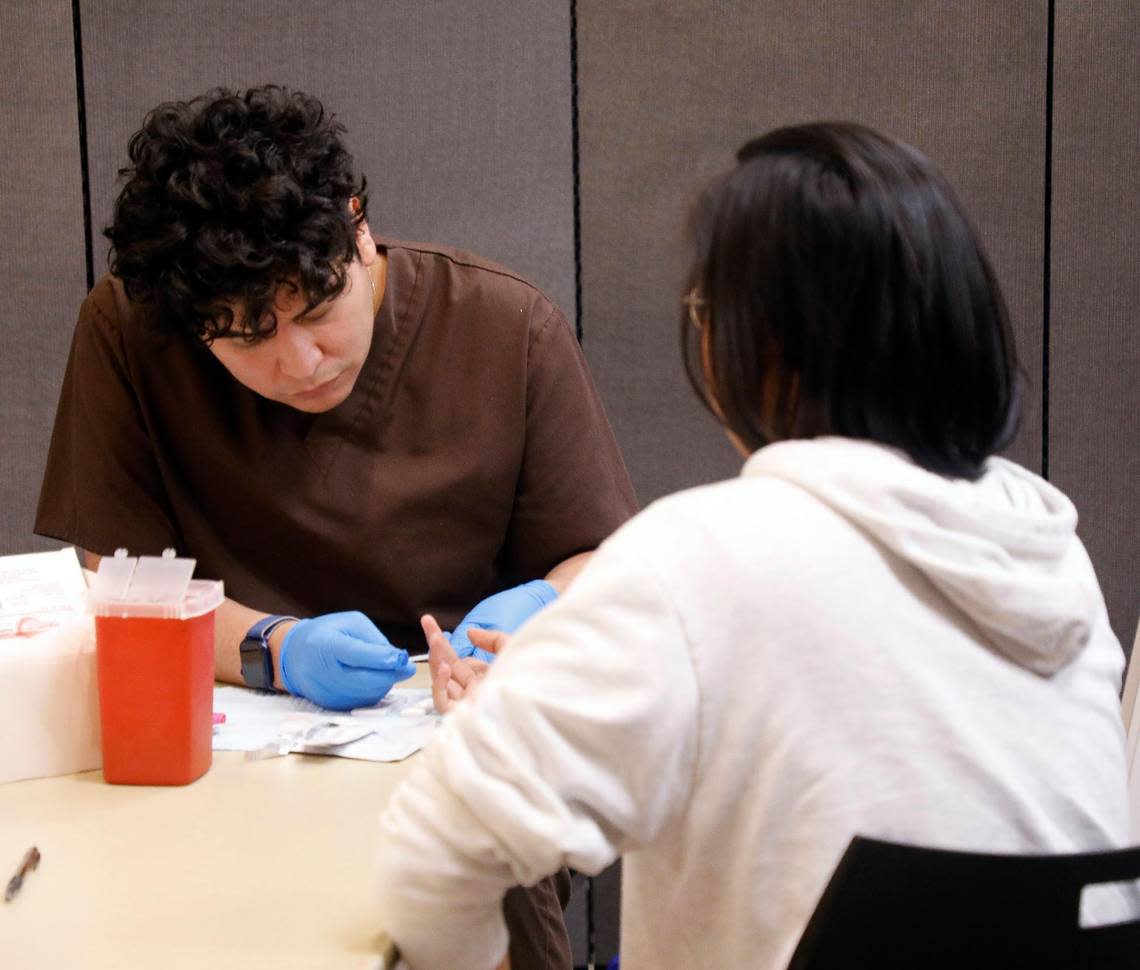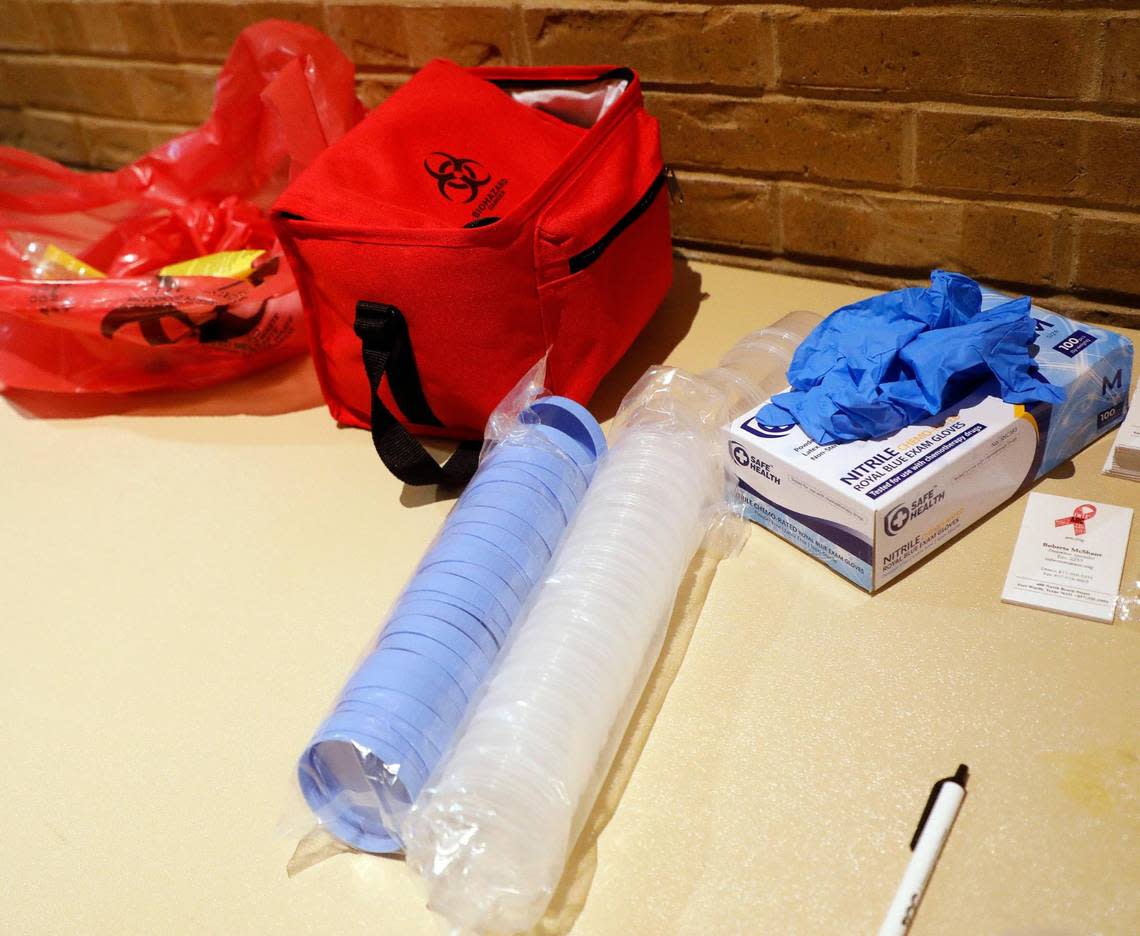Syphilis rate increases 8-fold in Tarrant County as STIs surge at ‘astounding’ rate
Francisco Facundo squeezes a woman’s fingerpad before breaking the skin with a small prick. He fills a small pipette with her blood, and then puts a few drops on squares of plastic that look like at-home COVID tests.
He makes small talk, chatting to calm the woman’s nerves; it’s her first time doing this.
The woman, a student at Tarrant County College, is getting tested for sexually transmitted infections. The blood that Facundo drew from her finger will be used for rapid tests that can detect HIV and syphilis infections.
Facundo, a risk prevention specialist at the AIDS Outreach Center, travels throughout the county providing free testing for STIs. For those with a new infection, he offers support and resources for how to get treatment. For those who test negative, he educates people on how they can stay that way.
The woman was one of a few students who trickled into the testing event at the college’s Hurst campus in May. Classes had already ended for the semester, and the campus was quiet.
But sexual health providers and educators fear that small crowds at STI testing clinics might also be a sign that few people know about the risk of sexually transmitted infections, or realize that the nation is in the midst of a surge for most infections.

Tarrant County is no exception. In 2011, there were 6.7 cases of syphilis for every 100,000 county residents, according to state data. Ten years later, the rate increased to 57.4 cases for every 100,000 people, according to data from the Department of State Health Services.
Elizabeth Cardwell, the lead clinician at Planned Parenthood of Greater Texas, called the rates of STIs “astounding.” At the beginning of Caldwell’s career, more than 20 years ago, she might see one or two gonorrhea cases a year come through her Arlington clinic. Now, she said, that same clinic will see one or two cases a day.
“Basically, we’re losing the battle,” she said.
Chlamydia, syphilis and gonorrhea increasing
The four most closely tracked STIs are HIV, chlamydia, syphilis and gonorrhea.
All four infections can have long term consequences if left untreated, and all of them can affect infants in the womb. But the infection that providers are most worried about is syphilis. During pregnancy, the disease can cause miscarriages, stillbirths, and early infant death. For the children who do survive, untreated syphilis can lead to meningitis and other brain infections, blindness and deafness, liver disease, severe anemia, and more.
Every case of congenital syphilis is considered “a dramatic and tragic indicator of public health failure,” according to a consensus study report from the National Academies of Sciences, Engineering and Medicine.
In Tarrant County, there were 55 cases of congenital syphilis in 2021, the most recent year for which data is available, according to data provided by the Department of State Health Services. That’s up from 32 cases in 2020.
Nationwide, syphilis caused 220 stillbirths and early infant deaths in 2021, according to the U.S. Centers for Disease Control and Prevention.

Cases of congenital syphilis can be easily prevented if the mother is treated during pregnancy. By Texas law, pregnant people must be tested for syphilis three times over the course of their pregnancy, to ensure that no case of syphilis is missed. But cases are being missed, experts said, either because some new moms don’t have access to prenatal health care or because providers aren’t testing for syphilis.
Congenital syphilis was considered close to eradication in the early 2000s, but since then the trend has turned in the wrong direction. In 2000, fewer than 100 Tarrant County residents tested positive for syphilis, according to a county report.
Gonorrhea and chlamydia are on the rise too, but aren’t rising as quickly as syphilis is.
And as new cases of disease increase, they are not affecting all Americans equally: Black, Latino, and LGBTQ+ adults are disproportionately affected by STIs. In 2017, rates of new infections were highest in Fort Worth’s 76104 ZIP code, and Black Tarrant County residents suffered the highest rates of new STI infections. Residents of the 76104 neighborhood have suffered worse health outcomes for a range of diseases because of poor access to health care.
Why are cases increasing?
The exact reason for the rapid rise in infections is unknown. Although the COVID-19 pandemic accelerated the rise in STIs, it didn’t initiate it, experts said. The general theory is that as new treatments and prevention for HIV became available, and the disease itself became less deadly, the focus on safe sex and condom use became less urgent.
But any progress toward reducing the infection has been curtailed by the COVID-19 pandemic, when virtually all public health resources went toward tracking and understanding the then-unknown virus.
Dr. Kenton Murthy, the assistant medical director for Tarrant County Public Health, said he expects to see increased rates of STIs for at least the next five to 10 years as the world recovers from the pandemic.
“Prior to COVID, we were really making dents,” Murthy said.
How to get tested for sexually transmitted infections
When to get tested:
If you think you have been exposed to HIV, you should immediately go to a doctor’s office or sexual health provider to ask about a post-exposure prophylaxis, or PEP, regimen. If taken within 72 hours after an HIV exposure, PEP can greatly reduce your risk of becoming infected with the virus, but it is most effective the sooner it is taken after exposure.
If you think you have been exposed to a different infection, you will likely have to wait between five and seven days to take a test. If you take a test too early, you might get a false negative before the infection is detectable.
Where to get tested:
Free HIV, syphilis, chlamydia and gonorrhea tests are available at Tarrant County Public Health and at the AIDS Outreach Center. Many other providers provide services that are free or are offered on a sliding scale; for a full list, visit gettested.cdc.gov.
